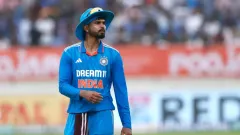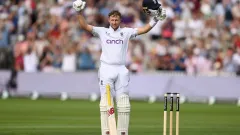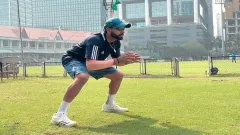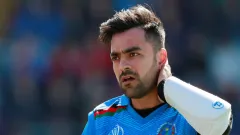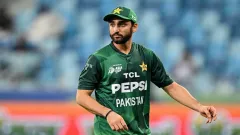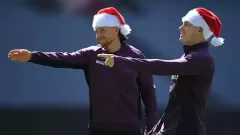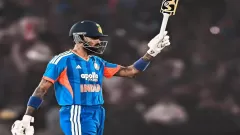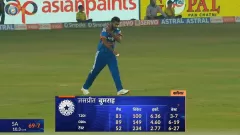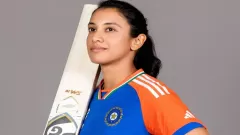Pravin Amre Interview: On Shaw Justifying the Talent God Has Given Him & Pant's Growing Stature Pravin Amre is much sought-after as a cricket coach.
“Coaching gives me great satisfaction. That is why I left the roles as Cricket Improvement Committee chairman and a managing committee member. I did not enjoy that. I enjoy coaching,” he says.
Some of the top names in Indian cricket have engaged his services when form abandoned them. Suresh Raina, Robin Uthappa, Ajinkya Rahane, to name just a few, have acknowledged Amre’s role when they really needed some upliftment.
Joining that list is Prithvi Shaw, the young sensation who began his Test career with a century against the West Indies in October 2018 but fell by the wayside due to attitude and lack of runs.
As Delhi Capitals assistant coach, the 52-year-old Amre took special care of Shaw in the suspended IPL 2021 after the opening batsman was dropped following the tour of Australia earlier this year.
Amre’s credentials as a coach include guiding Mumbai to three Ranji Trophy titles. A batsman from the famous ‘Dronacharya’ Ramakant Achrekar’s stables, Amre played in 11 Tests and 37 ODIs in the 1990s, scoring a century on his Test debut in Durban, 1992.
Amre talks exclusively to news18.com from his native place in Ratnagiri (Maharashtra), where he is taking a break from the hustle and bustle of Mumbai. He talks about coaching the likes of Shaw, Rishabh Pant and other stars of Indian cricket. Excerpts:
How do you deal with Rishabh Pant?
I have seen him from Day 1 when he came to Delhi Capitals selection trials from the India under-19 team and effortlessly hit sixes. His specialty is to hit sixes on slow tracks. That’s something special when the bounce is low. It struck me then that this boy was something different.
What we saw in the last six months for Team India was that he was showing more maturity, learning with experience. He is now in a good space, enjoying himself as a wicketkeeper and as a key batsman for the Indian team. He is also enjoying his role as a finisher. This year, when he came to the IPL, he was not that prepared for captaincy after Shreyas Iyer got injured.
But he showed a lot of positivity, building this team, backing it and being on the top. As a team gets successful, you have to give credit to the captain. In this format, the captain is more answerable than the coaches. DC won six of the eight matches this IPL. Credit goes to the captain as this format is driven by the captain.
How are your interactions with Pant during practice sessions?
To be honest, he was busy with Team India. He joined DC at the start of IPL. The head coach is Ricky Ponting, who has known Rishabh for years. It is important that the captain and head coach have a good relationship. My role was very limited. A major role was played by Ricky in handling the team.
Pant used to throw away his wicket after getting starts. How has he grown from that? He played responsibly during this IPL. Of course, his role in Australia cannot be forgotten.
He is taking responsibility whenever the team needs, likes to be there till the end. He is showing more maturity now as a player. One of the best advantages he had as captain was the good starts given by Shikhar Dhawan, who played his role beautifully, hanging in there, giving starts, also finishing matches.
Other batsmen too did their roles like Shimron Hetmyer. You may sometimes lose wickets, but the goal was to win matches. Nobody played for themselves, they played for the team.
How do you coach someone like Prithvi, who began well but had his downs?
I had the experience of working earlier with players like Robin (Uthappa), Suresh (Raina) who have had success in this format. Every case is different. With Prithvi, you know the talent is there. What he was lacking was hunger. It was crucial to get him on the right track. As coaches, our roles involve being a little hard on the players sometimes. For example, showing Prithvi the mirror after he was dropped from the Indian team earlier this year and asking where he stood.
He had a poor IPL last time. How he could bounce back was the first question I asked. One advantage he has is talent and age. But they are not the only criteria to be successful. To succeed, you need to work hard. We were all sure he would be successful simply because he had the ability. A couple of innings he played this IPL were truly amazing. It requires special talent to hit six fours in one over. It is not easy. His talent is natural.
We gave him the right direction, how he should be focussing, how he should be delivering that. Simply put, it is about justifying the talent God has given him.
Where does Prithvi go from here? With IPL suspended, is there some unfinished business with him?
He has room for improvement. Even when doing well, you have to maintain that. He is ticking most of the boxes. He is going to have a gap (before IPL resumes or the domestic season begins), we don’t know how long.
To get back the rhythm, he has to work hard. It was not much work during the IPL because he was in the tremendous nick. It was not that difficult because he was in good touch. Now the job for us is to get him back to the rhythm.
Now that IPL is suspended, do you tell him and others what they should be doing when they are in their respective bases?
The situation is such that nobody can do anything. They can focus on fitness. For skill training, everything is closed down. So they have to wait for the situation to improve. Also, the challenge is there when the monsoon begins next month or so. The pitches won’t be available. We need to work out how to get outdoor nets.
Last year, we worked with him at Shivaji Park in my own facility. We all are waiting for things to get alright. The entire country is going through a bad phase, it is more important to be calm, watchful and patient. We know that the talented bunch of players will be alright in one or 2 weeks of practice sessions.
When do you see Prithvi back in the Indian team?
To be honest, the franchise has given me the job to prepare him for white-ball cricket. We are not working on the red ball. He is a skilled player, he can play any format. There is going to be competition for places in the Indian team, which did well in Australia. It is not going to be easy for Prithvi. Not just one good performance will bring him back to the Indian team.
You need to be consistent. Prithvi had a good Vijay Hazare Trophy, followed it with a good IPL. And then he needs a good domestic season to get back into the Indian team. He is aware of that. Everyone was hopeful that after the Vijay Hazare Trophy and the way he batted in IPL, he would be in the reckoning for the Indian team. I told him, whatever is in his hands, he should focus on that. His goal should be to score runs wherever he is playing.
Where does Ajinkya Rahane stand with his white-ball cricket?
After IPL, he posted on Instagram that he felt comfortable and confident under me even though he was not regularly playing. That was a challenge I learned in the IPL. It is not just backing the playing 11 but also backing those not playing in the same manner. Ajinkya understands that. He is a professional who needed enough practice.
What do you expect from the Indian team on the tour of England next month? There are quite a few Delhi Capitals players in it – Pant, Rahane, Ishant Sharma, R Ashwin, Axar Patel, Umesh Yadav and Avesh Khan (standby).
As coaches, we want them to be in good form. Once they are in good touch, we don’t have to start from scratch with them when they come back to DC. We don’t know when the IPL will resume. Of course, it will be a challenge.
We don’t know if we will get time to prepare them. We would love to see our players who are in good nick and we can also focus on others who are not playing international cricket. Am not sure when domestic cricket will resume, so we need to work on our domestic players also. We would like to see our players score runs, get wickets as much as the rest of the Indian team in England.
You have been a successful coach throughout. What does coaching mean to you?
I was a great fan of Achrekar sir. I was very close to him. Being with him for many years, I started developing an interest in coaching. He was the one who asked me to take up coaching in 2000 at Shivaji Park Gymkhana academy in Mumbai where all those boys came from – Shardul Thakur, Shreyas Iyer, Siddesh Lad, to name just a few – from the first batch of my coaching assignment.
The journey started then. In 2006-07, I became Mumbai Ranji Trophy coach and was there for six years, winning three Ranji Trophy titles. That’s when I understood what coaching was all about, be very professional when working with the Mumbai Ranji Trophy, where the expectations are so high. Winning is so important for the Mumbai Ranji Trophy team. We are 41-time Ranji Trophy champions and the next best is Karnataka with eight titles.
I learned a lot during that phase because to win a championship, you need champion players, and it is so important to build those champion players. I was lucky to have Rohit Sharma, Ajinkya, those boys who have not only been playing for Mumbai but also the country for a long time.
The coach’s role in those initial years of the players are important, our backing is important when they are having a tough time. When the players are doing well, they don’t need coaching. When they are not doing well, that is when we need to back them.
Take the case of Shreyas Iyer. When he started, Mumbai did not win but still, we backed him and he became the first Mumbai player to score 1,300 runs or more in a Ranji Trophy season (2015-16). The same applied to Rohit and Ajinkya, their early years were not successful. That’s when I learned the role of a coach.
Our job is also at stake when you back such players, others may not like that sometimes. That is the challenge – back your gut feelings. Players also need that support system. You work for the institution or association and when the championship is won, you know you have played your role as a coach, and that is where the satisfaction comes.
How has the IPL experience been?
Not many Indian coaches have been for so long in IPL as I have. This is my 12th year in IPL. I feel there is a role for Indian coaches in IPL. We Indian coaches know domestic players better, every team will have a minimum of seven local players in the playing 11 and at least seven local players in the reserves.
The role of Indian coaches is very important. I worked first for Mumbai Indians, then Pune Warriors, Delhi Daredevils (before name rechristened to Delhi Capitals), back with Mumbai Indians, and now again with Delhi Capitals. That is also an important phase for me, working with some of the international coaches like Ricky Ponting. We also learn by interacting with them and understand the new generation of cricket, which is T20, and its demands.
That is also the time we get to work with Indian international players. IPL is so demanding, not like working for a state team or a national team. Working with a franchise is a different pressure. You have to perform every time. You have to be so good enough that people can give you the job.
What is the secret to your coaching method?
It is simple. Give your 100 percent, have total commitment, oversee the development of new players, pass on your experience. This format demands you to be that type of player who scores at a 130-140 strike rate. As a coach, that is the area to work as to how players perform under pressure.
For a couple of years, I also developed my own identity as a specialist batting coach. I worked with players individually like Suresh Raina, Robin Uthappa, Dinesh Karthik. That experience really worked for me, as also working with new generation players like Shreyas Iyer and Prithvi Shaw.
How different is it in coaching individually and coaching a team?
Not much difference. Take the case of Prithvi Shaw. He was dropped from the Indian team after the Australian tour. The Delhi Capitals management decided to help him and gave me that responsibility to work with him and see that in the upcoming season, Prithvi should be good enough because he is a key player, and he gave us good starts this IPL season 2021.
We completed half the IPL and Prithvi played his role as opener. Whatever successful starts we wanted, he delivered. That is the satisfaction he is enjoying because he was delivering. The franchise enjoyed the starts he gave. I am like a coordinator between the (head) coach and the franchise.
Both wanted success. We play our role in developing their skill, mental aspect, fitness. Cricket has changed but the basics are the same. It is more demanding when you play franchise cricket.
How do you keep upgrading yourself as a coach?
Handling top players is very crucial. That is what I learned in the Mumbai dressing room when Sachin Tendulkar, Zaheer Khan were there. IPL is different where you not only have Indian stars but also overseas stars like Kagiso Rabada, the main bowler. Ricky has got great communication skills, the way he handles them. We, as coaches, need to be more honest.
IPL can be more challenging to handle a group of 25 players. Everyone wants to play, those not playing are disappointed. We need to take care of them. They also understand that only four foreigners can play in the 11.
We have to stick to the team that is doing well, and at the same time keep others ready because IPL is such a funny tournament, we don’t know whom we will require at which moment. It is a challenge to handle the entire group. I learned from Ricky, who was good in handling not only the playing 11 but also those outside, making sure their intensity levels didn’t drop. That is a challenge for any coach in IPL, keeping them ready and ensuring they had the same intensity throughout like they were on Day 1.
How was your experience of being in the bubble? And you also Amit Mishra testing positive despite being in the bio-bubble. How safe did you feel?
To be honest, my daughter got affected when at home in Mumbai. Everyone at my sister’s place got affected. I was scared. I thought we were safe in the bubble. We were regularly tested, so we knew we were on the right track. You took utmost care. Every team was aware and careful. It did not start with Amit. In the beginning, Devdutt Padikkal (RCB) tested positive, Axar Patel also tested positive. They came back and played.
We knew it was a difficult phase but at the same time, we were staying in a positive frame of mind. At home, you might take things for granted. But in a bubble, you cannot take anything for granted. You are worried about yourself, your team, the entire DC unit which was about 90 of us. If one got affected, everyone got affected just because of one person’s mistake. Everyone was more responsible and ensured he was not affected nor were the teammates affected. That also resulted in better team bonding.



